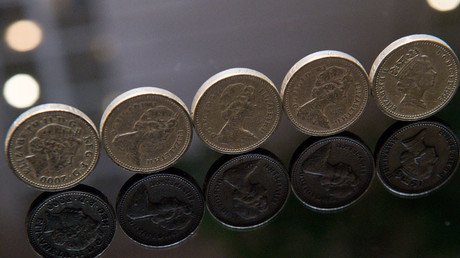Pound headed for worst month since Brexit vote

The British pound is on track for a sixth consecutive month of losses, and is poised for the biggest monthly decline since the UK voted to leave the European Union.
Sterling has fallen more than six percent in October on speculation of a so-called ‘hard’ Brexit which would see Britain leave the single market and switch to World Trade Organization rules.
The pound has fallen every month since April, and weakened more than 17 percent against the US dollar, trading at $1.2153 as of 2:45pm GMT on Monday.
READ MORE: ‘Hard Brexit’ could lead Britain to lose up to 9.5% of GDP – leaked govt. papers
Some investors are worried a ‘hard’ Brexit will send the country into recession and boost its current account deficit, already one of the highest among developed countries.
Leaked government papers estimate a ‘hard Brexit’ could cost the UK Treasury up to £66 billion in lost tax revenue each year and cause a GDP drop of up to 9.5 percent.
“This month has all been about hard Brexit concerns coming to the forefront,” foreign exchange strategist Viraj Patel at ING in London told Bloomberg. “It’s typical for a currency trading under heightened political uncertainty to be vulnerable to new news, either good or bad, and this will be an ongoing factor until we get clarity” over the country’s future relationship with the EU, he said.
Uncertainty over Bank of England Governor Mark Carney staying on the job for his full eight year term could further undermine confidence in the sterling, experts say.
Weak pound sends UK inflation rate near 2-yr high https://t.co/XuGyU5erK7pic.twitter.com/qnZAmEMusp
— RT (@RT_com) August 16, 2016
Any "unplanned or reactionary change" at the top of the Bank of England could prove "destabilizing" for an already volatile pound, according to Paresh Davdra from RationalFX.
“Whatever Carney’s announcement on his future may be, its effect will surely be felt in the pound,” Davdra told The Telegraph.
The Bank of England is expected to make its interest rate decision and publish the quarterly inflation report on Thursday. Carney may also announce a decision on his future at the central bank.













